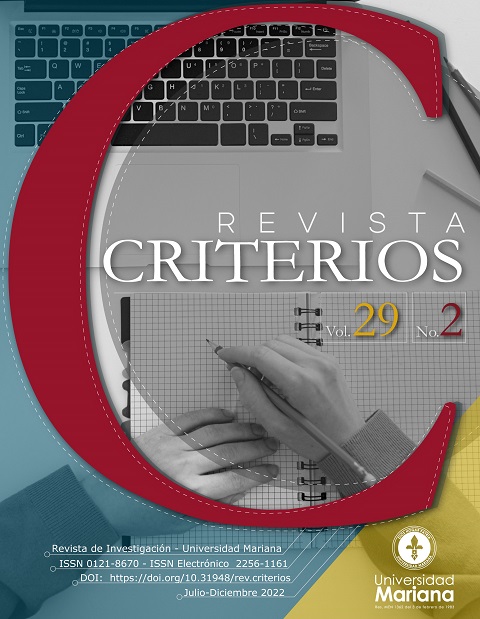Emergent reading and writing in children through the story
DOI:
https://doi.org/10.31948/rev.criterios/29.2-art4Keywords:
emerging reading, emerging writing, knowledge, skills, storiesAbstract
The article, a result of research, was carried out under the academic support of the analysis of emerging reading and writing skills and knowledge in children aged 5 and 6, through children’s reading. The research was developed because, despite the existence of ministerial pedagogical guidelines about the process of developing communication skills in the transition grade, the Basic Learning Rights of the transition grade and guidelines to promote emerging reading and writing in the grade of transition, that clearly establish the different achievements that characterize an optimal development of early literacy and learning indicators that allow evaluating the degree to which they should be achieved by children, there are still obstacles in the institution, on the part of teachers, to get the boy and girl to reach these goals because they see this achievement as unattainable due to the age of the child, which is why this research draws the borders and concludes that boys and girls are prepared to phonetic, grammatical and sociolinguistic constructions for reading.
Author Biographies
Martha Lucía Larraniaga López
Licenciada en preescolar; Magíster en Pedagogía.
Jessica Andrea Bejarano Chamorro
Licenciada en Filosofía y Ciencias Religiosas; Magister en Pedagogía; Estudiante de doctorado de la Universidad del Valle.
References
Anónimo. (2022). Cuentos clásicos. Caperucita Roja. https://cuentos-infantiles-muy-cortos.blogspot.com/2019/07/caperucita-roja.html?m=1
Badian, N. (1998). Predicting reading ability over the long term: The changing roles of letter naming, phonological awareness, and orthographic processing. Annals of Dyslexia, (45), 9-96. https://doi.org/10.1007/BF02648213 DOI: https://doi.org/10.1007/BF02648213
Bejarano, J. A. y Mafla, L. C. (2019). Filosofía para niños: el programa que despierta la creatividad y el pensamiento crítico. Revista UNIMAR, 37(2), 107-131. https://doi.org/10.31948/Rev.unimar/37-2-art7 DOI: https://doi.org/10.31948/Rev.unimar/37-2-art7
Bonilla-Castro, E. y Rodríguez, P. (2005). Más allá del dilema de los métodos: la investigación en Ciencias Sociales (3.ª ed.). Universidad de Los Andes y Grupo Editorial Norma.
Borda, M. I. (2000). Estrategias de comprensión lectora en los talleres de lectura de los cuentos infantiles. Lenguaje y Textos, (15), 51-60.
Braslavsky, B. (s.f.). Las nuevas perspectivas de la alfabetización temprana. http://www.lecturayvida.fahce.unlp.edu.ar/numeros/a21n4/21_04_Braslavsky.pdf
Condemarin, M. (2001). Jugar y leer: guía para padres y animadores de lectura. Editorial Del Nuevo Extremo S. A.
De Bono, E. (2004). El pensamiento creativo. El poder del pensamiento lateral para la creación de nuevas ideas. Editorial Paidós.
Fernández, G. (2015). Las emociones a través de los cuentos [Tesis de Pregrado, Universidad Católica San Antonio]. https://docplayer.es/17375173-Las-emociones-a-traves-de-los-cuentos.html
Ferreiro, E. y Teberosky, A. (1991). Los sistemas de escritura en el desarrollo del niño. Editorial Siglo XXI.
Ferreiro, E. (2006). La escritura antes de la letra. CPU-e Revista de Investigación Educativa, (3), 1-52. https://doi.org/10.25009/cpue.v0i3.136 DOI: https://doi.org/10.25009/cpue.v0i3.136
Jolibert, J. (1999). Formar niños productores de textos. Ediciones Hachette.
Goodman, Y. (1992). Los niños construyen su lectoescritura. Librería Anticuaria Jerez.
Kaufman, A. M. (1994). Escribir en la escuela: qué, cómo y para quién. Lectura y Vida, 15(3), 1-18.
Kaufman, A. M. (Coord.). (2007). Leer y escribir: el día a día en las aulas. Aique Grupo Editor.
Marroquín, M., Bejarano, J. y Montenegro, A. (2021). Investigación para la práctica pedagógica. Editorial UNIMAR. DOI: https://doi.org/10.31948/editorialunimar.149
Ministerio de Educación Nacional (MEN). (2009a). Instrumento diagnóstico de competencias básicas en transición. Ministerio de Educación Nacional.
Ministerio de Educación Nacional (MEN). (2009b). Elementos conceptuales. Aprender y Jugar, Instrumento Diagnóstico de Competencias Básicas en Transición. Ministerio de Educación Nacional.
Ministerio de Educación Nacional (MEN). (2014). Documento N° 20: el sentido de la educación inicial. https://www.mineducacion.gov.co/portal/men/Publicaciones/Documentos/341810:Documento-N-20-El-sentido-de-la-educacion-inicial
Molinari, J. M. (2003). Psicología clínica en la posmodernidad: perspectivas desde el construccionismo social. Psykhe, 12(1), 3-15.
Orozco, B. C. (2004). El niño lector y escritor. ¿Lee el niño preescolar? Universidad del Valle.
Pardial, R. y Sáenz-López, P. (2014). Los cuentos populares/tradicionales en educación infantil. Una propuesta a través del juego. E-motion, Revista de Educación, Motricidad e Investigación, (2), 32-47. https://doi.org/10.33776/remo.v0i2.2375 DOI: https://doi.org/10.33776/remo.v0i2.2375
Parodi, G., Peronard, M. e Ibáñez, R. (2010). Saber leer. Santillana, Ediciones Generales, S. L.
Solé, I. (2001). ¿Lectura en educación infantil? Sí, gracias. En Bofarull, M. T., Comprensión lectora. El uso de la lengua como procedimiento (pp. 69-78). Editorial Laboratorio Educativo Graó.
Sosa, R. J. (2019). A leer se aprende leyendo. La mediación de la lectura en la formación de lectores críticos de Rod Medina. Gaceta de Pedagogía, (38), 255-259.
Teal, W.H., & Sulzby, E. (1989). Emergent literacy: new perspectives. En D.S. Strickland & L.M. Morrow (Eds.), Emerging literacy: Young children learn to read and write (pp. 1-15). International Reading Association.
Vygotsky, L. S. (1998). Pensamiento y lenguaje. Teoría del desarrollo cultural de las funciones psíquicas (Trad. María Margarita Rotger). Ediciones Librerías Fausto.
Whitehurst, G. J. & Lonigan, C. J. (1998). Child development and emergent literacy. SRCD, Child Development, 69(3), 848-872. https://doi.org/10.1111/j.1467-8624.1998.tb0647.x DOI: https://doi.org/10.1111/j.1467-8624.1998.tb06247.x
How to Cite
Downloads
Downloads
Published
Issue
Section
License

This work is licensed under a Creative Commons Attribution 4.0 International License.
Revista Criterios es publicada por la Editorial UNIMAR de la Universidad Mariana bajo los términos de la licencia Creative Commons Reconocimiento 4.0 Internacional (CC BY 4.0)

| Article metrics | |
|---|---|
| Abstract views | |
| Galley vies | |
| PDF Views | |
| HTML views | |
| Other views | |




